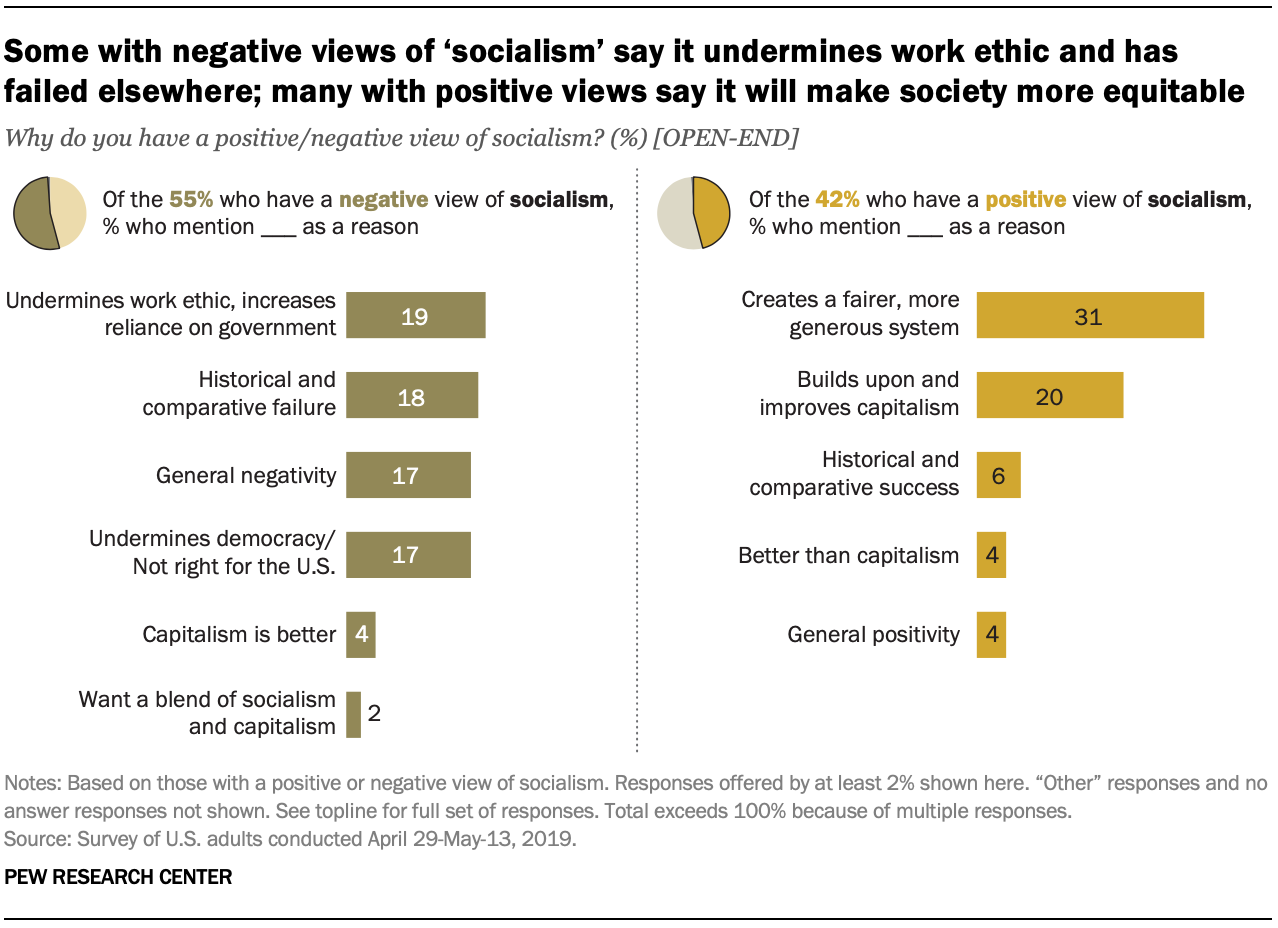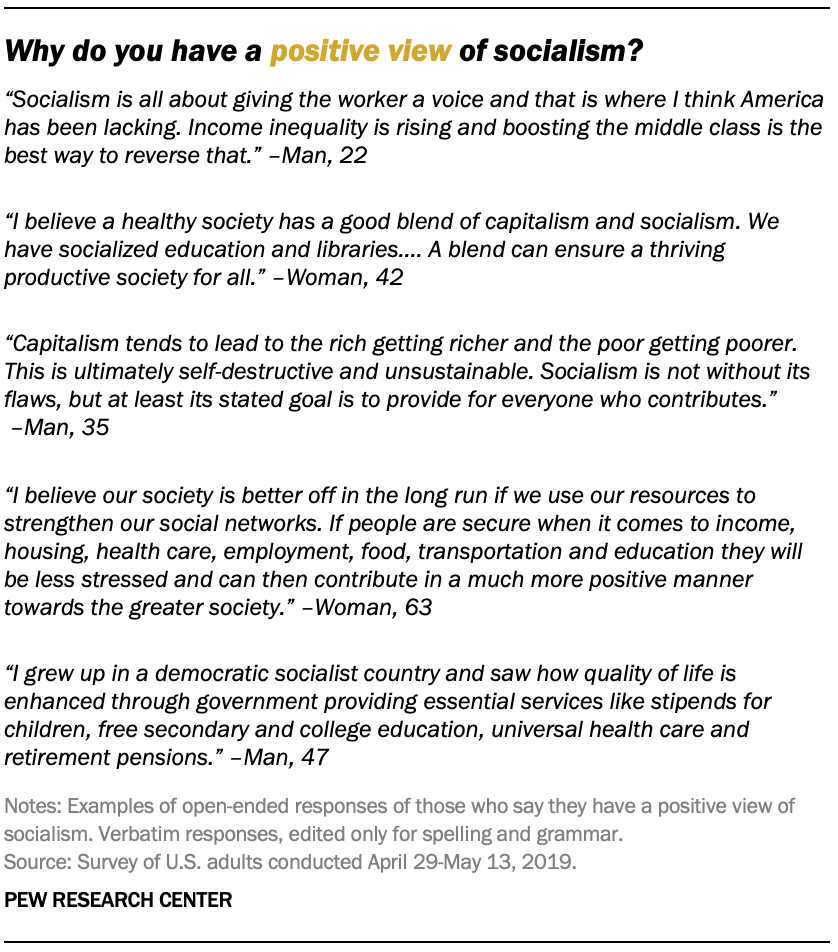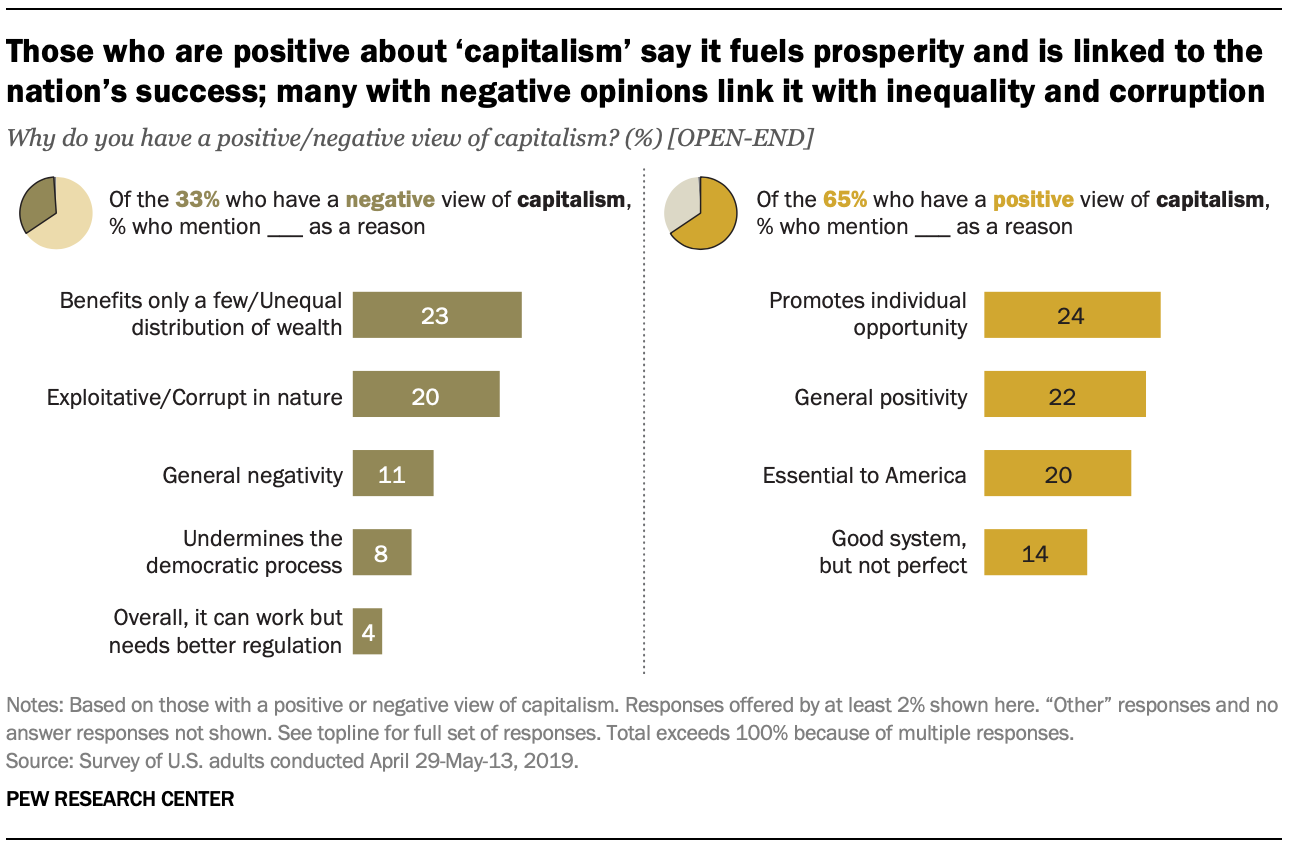For many Americans, “socialism” is a word that evokes a weakened work ethic, stifled innovation and excessive reliance on the government. For others, it represents a fairer, more generous society.
Critics of socialism point to Venezuela as an example of a country where it has failed. People with positive views of socialism cite different countries, such as Finland and Denmark, as places where it has succeeded.

Earlier this year, Pew Research Center found that 55% of Americans had a negative impression of “socialism,” while 42% expressed a positive view. About two-thirds (65%) said they had a positive view of “capitalism,” and a third viewed it negatively.
But what’s behind these opinions? To find out, we asked people to describe – in their own words – why they had positive or negative impressions of socialism and capitalism.
Some who view socialism negatively portray it as a serious threat to capitalism in the U.S., while others who view it positively say the opposite – that it builds upon and improves capitalism. And some who have a positive view of socialism express an explicit preference for a system that blends socialism and capitalism.
The survey found that Republicans, in particular, viewed socialism and capitalism in zero-sum terms. A large majority of Republicans and Republican-leaning independents (68%) had both a positive impression of capitalism and a negative view of socialism. However, Democrats and Democratic leaners were more likely to view both terms positively; a plurality (38%) had a positive impression of both socialism and capitalism.
While many of the open-ended impressions are revealing, a sizable share of people either did not share their views or articulated their reasons in simple terms, stating that socialism or capitalism is “good” or “bad,” or that one is better than the other. A quarter of those with a negative opinion of socialism – and 31% with a positive view – declined to offer a reason for their opinion.
But others mentioned history, the experiences of other nations, personal experiences or their own understandings of the terms in explaining the reasons behind their opinions of socialism and capitalism.
Socialism’s critics say it weakens work ethic; some point to Venezuela
 Among
the majority of Americans who have a negative impression of socialism,
no single reason stands out. About one-in-five (19%) say that socialism
undercuts people’s initiative and work ethic, making people too reliant
on the government for support. As a 53-year-old man put it: “I believe
in individual freedoms and choice. Socialism kills incentives for people
to innovate and climb the ladder of success.”
Among
the majority of Americans who have a negative impression of socialism,
no single reason stands out. About one-in-five (19%) say that socialism
undercuts people’s initiative and work ethic, making people too reliant
on the government for support. As a 53-year-old man put it: “I believe
in individual freedoms and choice. Socialism kills incentives for people
to innovate and climb the ladder of success.” About as many critics of socialism (18%) refer to how socialism has failed historically or in other countries, such as Venezuela or Russia. A comparable share of those with negative impressions of socialism (17%) say it is not consistent with democracy in the United States or is simply not right for the U.S.
Many with positive views of socialism say it fosters equality
 About
four-in-ten Americans (42%) have positive views of socialism. Among
this group, the most frequently cited reason is that it will result in
fairer, more generous society (31% say this). This includes 10% who
specifically express a belief that it is important for the government to
take care of its citizens or for fellow citizens to care for each
other.
About
four-in-ten Americans (42%) have positive views of socialism. Among
this group, the most frequently cited reason is that it will result in
fairer, more generous society (31% say this). This includes 10% who
specifically express a belief that it is important for the government to
take care of its citizens or for fellow citizens to care for each
other. A smaller share of Americans who have a positive view of socialism say it would build upon and improve capitalism (20%). Some in this group say the U.S. already has socialism, in the form of government programs. Others specifically say they prefer a blend of socialism and capitalism. “A blend can ensure a thriving productive society for all,” said a 42-year-old woman.
Just 2% of those who have a positive view of socialism explicitly mention the phrase “democratic socialism” as the reason.
While some who express a negative view of socialism link it with countries like Venezuela, some of those with a positive view point to different countries – such as Denmark or Finland – as models. Among those with a positive impression, 6% say it has been a historical or comparative success, with most of these people citing how it has worked in European countries.
‘Capitalism’ viewed positively by about two-thirds of Americans
Among the 65% with a positive view of capitalism, many give reasons that contrast with criticisms of socialism. For example, while many who hold a negative view of socialism say it undermines initiative and makes people too dependent on government, nearly a quarter of those with a positive view of capitalism say it promotes individual opportunity (24% say this).
And while those with a positive view of socialism say it could bring increased equality, a common theme among critics of capitalism is that it has led to unequal distribution of wealth in this country.

 Nearly
a quarter of Americans who have a positive view of capitalism (24%) say
they hold their views because the system provides opportunity for
individual financial growth. A similar share (22%) expresses general
positivity towards capitalism, saying that the system works.
Nearly
a quarter of Americans who have a positive view of capitalism (24%) say
they hold their views because the system provides opportunity for
individual financial growth. A similar share (22%) expresses general
positivity towards capitalism, saying that the system works. One-in-five adults with positive views of capitalism associate the system with the foundation of America: They mention that capitalism has advanced America’s economic strength, that America was established under the idea of capitalism, or that capitalism is essential to maintaining freedom in the country.
Another 14% say that although they view capitalism positively overall, the system is not perfect. This includes 5% who say capitalism has caused economic inequality and corruption and 4% who express a desire to see more regulation or a mixed system with socialism.
“Capitalism is the worst way to set up a society, except for all the other ways,” said a 44-year-old man. “Free markets allow for more innovative solutions and for more people to succeed.”
 When
those who hold negative views of capitalism are asked why they hold
this view, about a quarter (23%) say that capitalism creates an unfair
economic structure, mentioning that the system only benefits a small
number of people or that wealth in this country is distributed poorly.
When
those who hold negative views of capitalism are asked why they hold
this view, about a quarter (23%) say that capitalism creates an unfair
economic structure, mentioning that the system only benefits a small
number of people or that wealth in this country is distributed poorly. A similar share (20%) says that capitalism has an exploitative and corrupt nature, often hurting either people or the environment.
A smaller share of Americans who have negative views of capitalism (8%) mention that corporations and wealthy people undermine the democratic process by having too much power in political matters. And 4% of those with a negative view say that capitalism can work, but to do so it needs better oversight and regulation.

אין תגובות:
הוסף רשומת תגובה